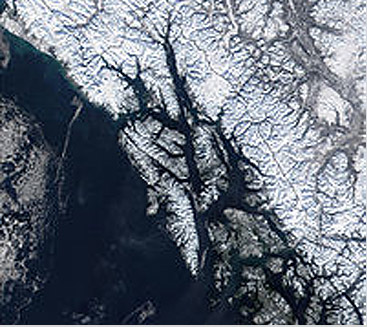
But my unnerving meeting, in the wet, with the humpback and the mob of sea lions showed me otherwise. It made evident, in a way I could no longer ignore, that there exists a primary language that we two – leggeds share with other species.
When we speak of “language,” we speak of an ability to communicate, a power to convey information across a thickness of space and time, a means whereby beings at some distance from one another nonetheless manage to apprise each other of their current feelings or thoughts. As humans, we rely upon a complex web of mostly discrete, spoken sounds to accomplish our communication, and so it’s natural that we associate language with such verbal intercourse. Unfortunately, this association has led many to assume that language is an exclusive attribute of our species – we, after all, are the only creatures that use words – and to conclude that all other organisms are entirely bereft of meaningful speech. It is an exceedingly self-serving assumption.
Other animals, commonly possessed of senses far more acute than ours, may have much less need for a purely conventional set of signs to communicate with others of their species, or even to glean precise information from members of other species. My encounter with the sea creatures had initiated me into a layer of language much older, and deeper, than words. It was a dimension of expressive meanings that were directly felt by the body, a realm wherein the body itself speaks – by the tonality and rhythm of its sounds, by its gestures, even by the expressive potency of its poise. A near catastrophic confrontation had plunged me into a space of earnest communication that enfolded entirely without words, a carnal zone of articulations broadly shared across species. It was a dimension wherein my verbal self was hardly present, but where an older, animal awareness came to the fore, responding spontaneously to the gestures of these other animals with hardly any interpolation by my “interior” thinking mind. It was rather as if my body itself was doing the thinking, trading vocal utterances and physical expressions back and forth with these other smooth – skinned and sentient creatures. Their flippers and fins were obviously shaped to a liquid medium very different from my own primary element, yet the most basic sensations of threat, or calm, or pleasure could still be swiftly exchanged – via the tautness or relaxation of various muscles, coupled with the tone of our uttered sounds – by virtue of our mutual existence as kinetic and sonorous beings inhabiting the same biosphere.
Sure, we were all mammals – the sea lions, the whale, and I – yet the sense I was left with was of a still more basic commonality or community of bodies, indeed of a communication shared as well with the waves shuddering under the kayak and splashing their speech upon the rocks. To the fully embodied animal any movement might be a gesture, and any sound may be a voice, a meaningful utterance of the world. And hence to my own creaturely flesh, as well, everything speaks!

Certain sounds that reach our ears convey the felt intent of other persons, while certain other, rumbling sounds bespeak a change in the weather. A rippling sequence of whistling tones expresses the exuberance felt by a thrush as the sun climbs above the horizon; other tones convey the dark magic of the night itself, speaking through the hissing tires on wet pavement.
Our human conversations are regularly influenced by this carnal layer of language, the apparent meaning of a friend’s phrase altering with the pace of her speaking. The tenor of a spoken exchange may be transformed, without either of us noticing, when a break in the winter clouds allows the sun to spill its song over the muted hues of the city street where we stand, or by an abrupt and escalating argument of honking vehicles on the same avenue.






